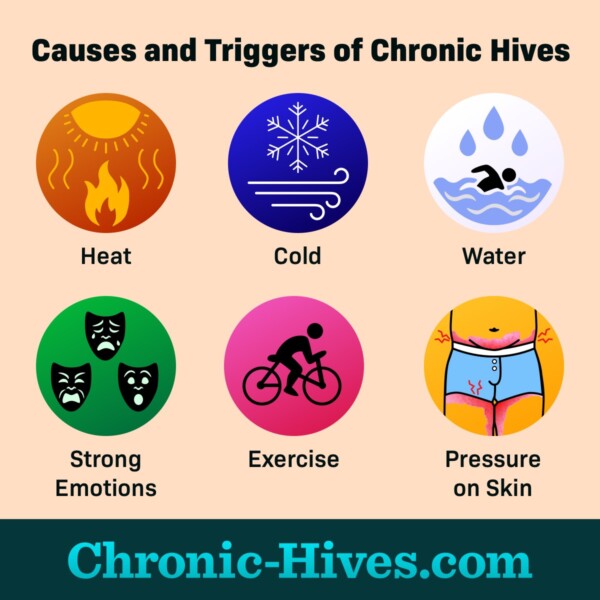What Are Causes and Triggers of Chronic Hives?
Reviewed by: HU Medical Review Board | Last updated: December 2025
Chronic hives usually has no known cause. Doctors use the terms idiopathic or spontaneous to describe this type of chronic hives. If there is a known physical trigger or cause, it is called physical urticaria. Sometimes, physical exposures can worsen symptoms but are not the cause.1,2
Hives happen when certain cells release a chemical called histamine, which causes many of the symptoms of allergies. Several theories try to explain why this happens for people with chronic hives. However, we do not have enough evidence to understand the body processes that lead to chronic hives.1,2
Idiopathic urticaria versus physical urticaria
Idiopathic urticaria is a type of chronic hives where doctors cannot identify a cause. About 80 to 90 percent of chronic hives cases are idiopathic. On the other hand, physical urticaria describes hives caused by a known environmental stimulus.1

Physical urticaria is divided into subtypes based on the trigger. Many of these subtypes are very rare. Few people with chronic hives have multiple physical triggers. Some types of physical hives are triggered by:2
- Contact with cold objects, liquid, or air
- Heat, exercise, or strong emotions
- Sustained pressure
- Contact with a warm substance
- Contact with water
- Exposure to sunlight
The difference between idiopathic urticaria and physical urticaria can be blurry. In some people with idiopathic urticaria, physical exposures do not worsen or cause hives. But for many people, a physical exposure may worsen hives, but the actual cause is unknown.2
Possible causes of chronic hives
Hives happen when certain immune cells release histamine into the bloodstream. But we do not know what causes them to release histamine. Experts have developed theories that try to explain this body process.1
Autoimmune reaction
An autoimmune reaction happens when your immune system mistakenly attacks healthy cells. Many types of autoimmune diseases affect different body parts. For example, thyroid problems often happen when an autoimmune reaction changes how the thyroid produces hormones.1,3,4
Thyroid problems are more common among people with chronic hives. This led experts to believe that an autoimmune reaction is involved in chronic hives. This immune reaction may trigger histamine release from immune cells. But there is not yet enough evidence to prove this theory.3,4
Cellular defects
Two types of immune cells release histamine: mast cells and basophils. These are different types of white blood cells that play a role in allergy, anaphylaxis, and asthma.1
People with chronic hives may have differences in how mast cells and basophils work. For example, mast cells of people with chronic hives may release more histamine. Or, basophils may be more active in the skin of people with chronic hives.1
Other theories
Experts have posed many other theories to explain chronic hives. For example, chronic inflammation may increase the risk of developing chronic hives. Chronic infections and food allergies have also been linked to chronic hives. However, there is very little evidence to support these theories.1
Common triggers of chronic hives
Chronic hives are often triggered by physical exposures, even when the main cause is unknown. These triggers may not cause symptoms, but they may worsen them. Some common triggers include:5,6
- Heat or cold
- Tight clothing or straps
- Anti-inflammatory drugs
- Physical or mental stress
- Variations in diet, especially rich meals or spicy foods
- Alcohol
- Infections
- Sunlight
- Insects
Allergic reactions can also trigger hives. But they usually trigger acute hives. These are hives that last less than 6 weeks.6
Risk factors for chronic hives
Some indirect risk factors have also been linked to chronic hives. However, the current evidence of these risk factors is weak.7,8
Some individual risk factors that seem to increase the likelihood of acute or chronic hives include:7,8
- Family history of asthma, hay fever (allergic rhinitis), or atopic dermatitis (eczema)
- Remodeling a house or moving to a new house
- High income
- Insomnia and poor sleep
Many other health conditions are linked to chronic hives, such as autoimmune conditions. These co-occurring conditions may be risk factors for chronic hives. Or, chronic hives may be a risk factor for developing these conditions.